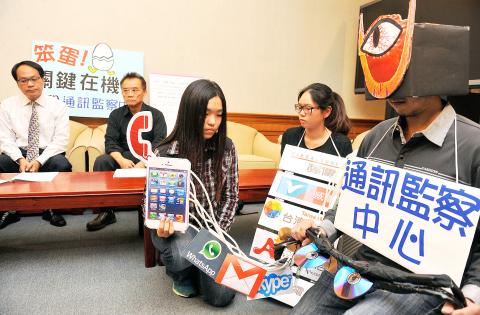The two communications surveillance centers at the heart of what critics call the government’s rampant abuse of wiretapping should be abolished immediately, the Judicial Reform Foundation said yesterday.
The centers, which were established in the 1990s, pose a threat to freedom of speech, foundation members said at a Taipei press conference held with National Chiao Tung University students.
“The severity of the government’s wiretapping abuse problem has been greatly underestimated. We believe the root cause of the problem is the government’s two communications surveillance centers and we plan to push for an amendment to the Communication Security and Surveillance Act [通訊保障及監察法] to disband them,” foundation executive director Lin Feng-jeng (林峰正) said.

Photo: Chien Jung-fong, Taipei Times
Citing government statistics, Lin said that prosecutors had on average applied for court approval for 15,000 wiretaps each year over the past five years, about 5.6 times the number of wiretap applications filed in the US and 520 times that seen in Japan.
Taking population sizes into account, the statistics showed that about 0.044 percent of the nation’s population of 23 million are monitored by the government annually, which is 50 times higher than the rate in the US and more than 1,900 times that in Japan, Lin said.
National Chiao Tung University electrical engineering professor Su Yu-ted (蘇育德) said the centers were founded “stealthily” by the government in 1992, with one affiliated to the Ministry of Justice’s Investigation Bureau and the other with the Ministry of the Interior’s National Police Agency.
Su said the wiretapping agencies had been deemed illegitimate in the past, but had been made legal.
“However, since 2000, all telecommunication operators have been required to set up transmission lines within the centers’ control rooms. This means that the communications of every citizen in this country go through the centers and are therefore subject to government surveillance,” Su said.
Greg Yo (尤伯祥), a member of the foundation’s executive committee, said the “September political strife” not only put the issue of the government’s wiretapping abuse on the table, but also proved that George Orwell’s “Big Brother” in his novel 1984 is not just a nightmare, but is alive now in Taiwan.
The strife Yo referred to erupted when it emerged that the Special Investigation Division of the Supreme Prosecutors’ Office illegally tapped the cellphone of Democratic Progressive Party caucus whip Ker Chien-ming (柯建銘) and the legislature’s switchboard. The division was probing Legislative Speaker Wang Jin-pyng (王金平) for allegedly improperly lobbying for Ker in a breach of trust case, claims which resulted in the Chinese Nationalist Party’s (KMT) Central Evaluation and Discipline Committee revoking the speaker’s membership.
“The wiretapping abuse has led to an unlimited expansion of the government’s powers. The existence of the two centers is unconstitutional because they are a threat to the public’s basic rights of freedom of speech,” Yo said.
Yo urged the public to dedicate more attention to the issue and join the foundation’s calls for the centers’ abolishment.

Chinese Nationalist Party (KMT) Chairman Eric Chu (朱立倫), spokeswoman Yang Chih-yu (楊智伃) and Legislator Hsieh Lung-chieh (謝龍介) would be summoned by police for questioning for leading an illegal assembly on Thursday evening last week, Minister of the Interior Liu Shyh-fang (劉世芳) said today. The three KMT officials led an assembly outside the Taipei City Prosecutors’ Office, a restricted area where public assembly is not allowed, protesting the questioning of several KMT staff and searches of KMT headquarters and offices in a recall petition forgery case. Chu, Yang and Hsieh are all suspected of contravening the Assembly and Parade Act (集會遊行法) by holding

PRAISE: Japanese visitor Takashi Kubota said the Taiwanese temple architecture images showcased in the AI Art Gallery were the most impressive displays he saw Taiwan does not have an official pavilion at the World Expo in Osaka, Japan, because of its diplomatic predicament, but the government-backed Tech World pavilion is drawing interest with its unique recreations of works by Taiwanese artists. The pavilion features an artificial intelligence (AI)-based art gallery showcasing works of famous Taiwanese artists from the Japanese colonial period using innovative technologies. Among its main simulated displays are Eastern gouache paintings by Chen Chin (陳進), Lin Yu-shan (林玉山) and Kuo Hsueh-hu (郭雪湖), who were the three young Taiwanese painters selected for the East Asian Painting exhibition in 1927. Gouache is a water-based

Taiwan would welcome the return of Honduras as a diplomatic ally if its next president decides to make such a move, Minister of Foreign Affairs Lin Chia-lung (林佳龍) said yesterday. “Of course, we would welcome Honduras if they want to restore diplomatic ties with Taiwan after their elections,” Lin said at a meeting of the legislature’s Foreign Affairs and National Defense Committee, when asked to comment on statements made by two of the three Honduran presidential candidates during the presidential campaign in the Central American country. Taiwan is paying close attention to the region as a whole in the wake of a

OFF-TARGET: More than 30,000 participants were expected to take part in the Games next month, but only 6,550 foreign and 19,400 Taiwanese athletes have registered Taipei city councilors yesterday blasted the organizers of next month’s World Masters Games over sudden timetable and venue changes, which they said have caused thousands of participants to back out of the international sporting event, among other organizational issues. They also cited visa delays and political interference by China as reasons many foreign athletes are requesting refunds for the event, to be held from May 17 to 30. Jointly organized by the Taipei and New Taipei City governments, the games have been rocked by numerous controversies since preparations began in 2020. Taipei City Councilor Lin Yen-feng (林延鳳) said yesterday that new measures by